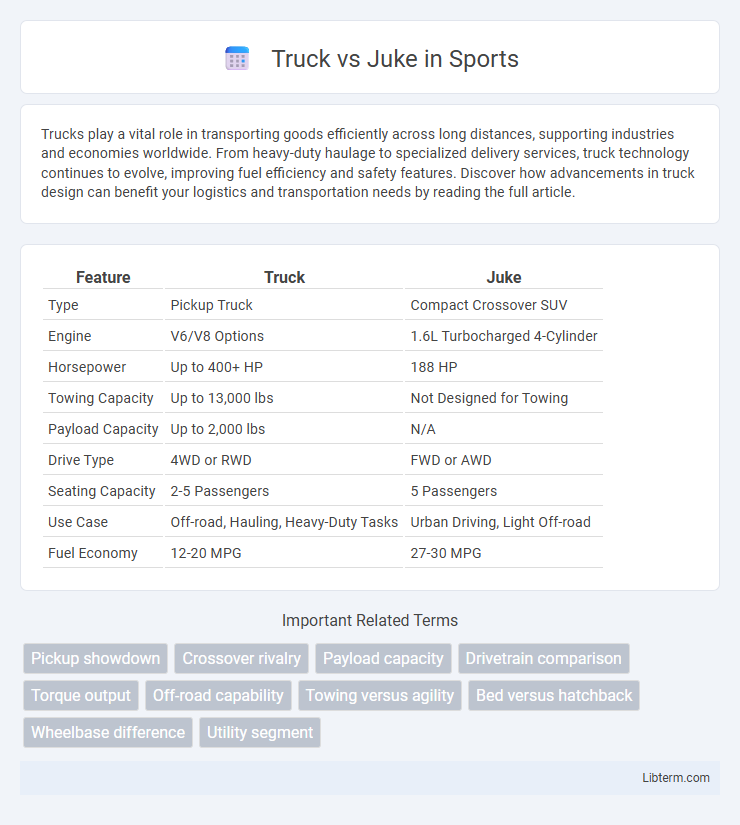Trucks play a vital role in transporting goods efficiently across long distances, supporting industries and economies worldwide. From heavy-duty haulage to specialized delivery services, truck technology continues to evolve, improving fuel efficiency and safety features. Discover how advancements in truck design can benefit your logistics and transportation needs by reading the full article.
Table of Comparison
| Feature | Truck | Juke |
|---|---|---|
| Type | Pickup Truck | Compact Crossover SUV |
| Engine | V6/V8 Options | 1.6L Turbocharged 4-Cylinder |
| Horsepower | Up to 400+ HP | 188 HP |
| Towing Capacity | Up to 13,000 lbs | Not Designed for Towing |
| Payload Capacity | Up to 2,000 lbs | N/A |
| Drive Type | 4WD or RWD | FWD or AWD |
| Seating Capacity | 2-5 Passengers | 5 Passengers |
| Use Case | Off-road, Hauling, Heavy-Duty Tasks | Urban Driving, Light Off-road |
| Fuel Economy | 12-20 MPG | 27-30 MPG |
Overview: Truck vs Juke
The truck delivers superior towing capacity, rugged durability, and enhanced cargo space, making it ideal for heavy-duty tasks and off-road performance. The Juke emphasizes compact design, fuel efficiency, and urban maneuverability, targeting drivers seeking agility and modern styling in a small SUV. Both vehicles cater to distinct needs, where the truck excels in utility and the Juke offers convenience and versatility in city environments.
Design and Aesthetics Comparison
The Truck features a rugged, utilitarian design with bold, angular lines and a high ground clearance, emphasizing durability and off-road capability. The Juke showcases a compact, sporty aesthetic with curvaceous bodywork, distinctive front headlights, and a dynamic roofline that appeals to urban drivers. Both vehicles offer unique styling cues tailored to different lifestyle preferences, with the Truck prioritizing toughness and the Juke focusing on modern, playful aesthetics.
Engine Performance and Power
The truck offers a robust engine lineup typically featuring V6 or V8 options delivering horsepower ranging from 280 to 450, designed for heavy-duty towing and hauling with torque often exceeding 400 lb-ft. The Nissan Juke's engine is smaller, usually a turbocharged 1.6-liter four-cylinder producing around 188 horsepower with 177 lb-ft of torque, emphasizing fuel efficiency and urban agility over raw power. Trucks prioritize horsepower and torque to maximize payload capacity and off-road capability, while the Juke focuses on responsive acceleration and nimble handling suitable for city driving.
Interior Comfort and Features
The Nissan Juke offers a compact yet stylish interior with advanced tech features like a customizable digital display and Bose premium audio system, enhancing cabin comfort for urban driving. In contrast, trucks like the Ford F-150 prioritize spaciousness with large, durable seats and practical storage options tailored for work environments. Both vehicles provide modern connectivity options, but the Juke targets comfort and style, while trucks emphasize rugged utility and ergonomic support.
Cargo Space and Practicality
The Nissan Juke offers a compact cargo space of approximately 10.5 cubic feet, ideal for daily urban errands and small loads, whereas most trucks, such as the Ford F-150, provide a significantly larger cargo bed exceeding 60 cubic feet, accommodating heavy-duty hauling and large equipment. Trucks feature versatile bed sizes and optional bed liners, enhancing practicality for construction, landscaping, and outdoor activities. The Juke prioritizes maneuverability and passenger comfort, while trucks excel in cargo capacity and adaptability for commercial and recreational use.
Fuel Efficiency and Running Costs
The Nissan Juke offers superior fuel efficiency, averaging around 30 miles per gallon in combined city and highway driving, making it more economical for daily commutes compared to most full-size trucks, which typically achieve 15-20 miles per gallon. Running costs for the Juke are generally lower due to reduced fuel consumption, cheaper maintenance, and less expensive parts. Trucks, while more versatile for heavy-duty tasks, incur higher fuel expenses and increased maintenance costs, impacting overall affordability.
Safety Features and Ratings
The Nissan Juke offers advanced safety features such as automatic emergency braking, blind-spot monitoring, and lane departure warning, earning high safety ratings from the IIHS and NHTSA. In contrast, pickup trucks like the Ford F-150 provide robust safety technologies including adaptive cruise control, forward collision warning, and enhanced trailer sway control, often achieving top safety scores in their segment. Both vehicles prioritize occupant protection, but the Juke's compact design emphasizes pedestrian detection, while trucks focus on towing stability and crashworthiness.
Off-Road Capabilities
The truck offers superior off-road capabilities with higher ground clearance, robust suspension systems, and four-wheel-drive options tailored for rugged terrains. The Nissan Juke, designed primarily as a compact crossover, features limited off-road performance with less ground clearance and a softer suspension for urban driving. For serious off-roading, the truck's durability, torque, and drivetrain options outperform the Juke's lighter, road-focused design.
Technology and Connectivity
The Truck offers advanced connectivity with integrated telematics and a large touchscreen interface supporting Apple CarPlay and Android Auto for seamless smartphone integration. The Juke features NissanConnect technology with smartphone app integration and access to navigation, music, and emergency services through its intuitive infotainment system. Both vehicles incorporate driver-assistance technologies, but the Truck emphasizes rugged, utilitarian tech like trailer sway control, while the Juke focuses on urban-friendly features such as ProPILOT Assist for enhanced city driving.
Pricing and Value for Money
The Nissan Juke typically offers a more affordable entry price compared to most trucks, appealing to budget-conscious buyers seeking compact crossover utility and fuel efficiency. Trucks, on the other hand, often command higher prices due to their larger size, increased towing capacity, and rugged features, providing greater value for those needing heavy-duty performance and payload versatility. Evaluating the total cost of ownership, including fuel, maintenance, and insurance, the Juke tends to deliver better long-term savings, while trucks justify their cost through enhanced durability and functionality for demanding workloads.
Truck Infographic

 libterm.com
libterm.com